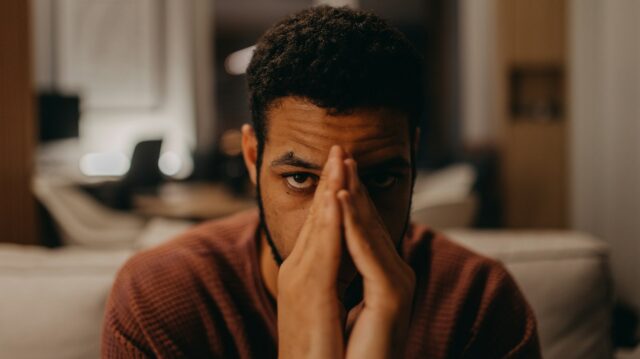13 Questions To Ask Yourself If You Don’t Like People
 Envato Elements
Envato Elements If you’re not a fan of people in general, you’re not alone.

Plenty of us struggle with a general distaste for humanity at times. But while a certain amount of misanthropy is understandable, living in a constant state of “ugh, people” can be isolating and unhealthy. If you’ve been feeling especially people-averse lately, it’s worth thinking a little harder about your antisocial instincts. Here are 13 questions to ask yourself if you just don’t like people. They might help you get to the bottom of why you feel the way you do.
1. Are my expectations of people unrealistic?
 Source: Unsplash
Source: Unsplash Nobody’s perfect, so if you’re expecting everyone you meet to be a paragon of virtue, intelligence and charm, you’re setting yourself up for disappointment. Holding people to impossibly high standards — expecting them to never be boring, never make mistakes, never have off days, never disagree with you — is a recipe for resentment. Take an honest look at whether your expectations of people are fair and realistic. You may need to extend more grace and understanding.
2. Have I been burned one too many times?

If you’ve had a string of friend breakups, toxic work environments, or bad relationships, your misanthropic stance may be more about self-protection than an inherent dislike of people. Past hurts can make you want to close yourself off and assume the worst about everyone to avoid future pain. But letting those negative experiences colour your entire worldview robs you of the chance to meet amazing people. Work on healing your wounds so you can open up again.
3. Am I an introvert who needs more alone time?
 Source: Unsplash
Source: Unsplash Introversion isn’t pathological — some of us just need more solitude to recharge than others. But if your needs for alone time aren’t being met, your “people-are-exhausting” feelings may be more about your own irritability and overwhelm than anything else. Make sure you’re carving out enough restorative solo time in your schedule. Honour your natural social rhythms and limits. Pushing yourself to be “on” 24/7 is a fast track to misanthropy.
4. Am I surrounding myself with the wrong crowd?
 Source: Unsplash
Source: Unsplash The people you spend the most time with can have a huge impact on your general feelings about humanity. If you’re constantly around gossips, energy vampires, one-uppers, or Negative Nancies, it’s no wonder you’re not feeling keen on people in general. Take stock of your social circle and consider whether it needs an overhaul. Try to find more positive, supportive, growth-oriented people to surround yourself with. You may find your faith in humanity restored.
5. Do I need to adjust my attitude and mindset?
 Source: Unsplash
Source: Unsplash According to Psychology Today, your beliefs shape your experience of reality. If you go into every interaction expecting the worst from people, that negativity becomes a self-fulfilling prophecy. You end up subconsciously seeking evidence to confirm your grim view of humanity. Challenge yourself to adopt a more optimistic, compassionate mindset. Actively look for the best in people and give them the benefit of the doubt. That mental shift alone can work wonders.
6. Am I projecting my own insecurities onto the people around me?
 Source: Unsplash
Source: Unsplash Sometimes our judgments and criticisms of other people are really a reflection of the things we don’t like about ourselves. If you have a lot of unresolved self-loathing, you may subconsciously assume everyone else is judging you as harshly as you judge yourself. That defensiveness can breed hostility and disdain. Do some self-reflection to determine if your issues with people are really a projection of your own baggage. Therapy can help.
7. Do I need to work on my conversation skills?
 Source: Unsplash
Source: Unsplash If you find most of your interpersonal interactions boring, awkward or strained, your misanthropy may be more about your own social skills than other people’s inherent lameness. Conversation is an art that requires practice. If you’re not actively listening, asking questions, sharing vulnerably and bringing your own energy to interactions, of course they’ll fall flat. Work on honing your social savvy. The more engaging you are, the more you’ll start to enjoy people.
8. Am I hung up on being right all the time?
 Source: Unsplash
Source: Unsplash If you view every conversation as a battle to be won and every interaction as a chance to prove your intellectual superiority, you’ll quickly grow to resent people. Always needing to be the smartest, most knowledgeable, most correct person in the room is exhausting for you and off-putting to people. Learn to appreciate different viewpoints, pick your battles, and engage in dialogue, not diatribe. Being open and receptive will make people much more pleasant company.
9. Do I have a scarcity mindset about human connection?
 Source: Unsplash
Source: Unsplash If you’ve been burned by a lot of social rejection, romantic disappointment or friendship breakups, you may have internalized the message that genuine connection is a rare commodity you have to fight for. That scarcity mindset can breed resentment, jealousy and a general aversion to people. Remind yourself that there are 7 billion humans on this planet — you will click with your tribe. Operate from a mentality of abundance. Assume there are great people out there for you.
10. Am I putting too much pressure on interactions?
 Source: Unsplash
Source: Unsplash Expecting every conversation to be deep and meaningful and every new person to be best friend material is a lot of pressure. If you put that much weight on every interaction, of course you’ll be frequently let down. Learn to appreciate people in small doses, for who they are. Enjoy the brief moments of banter with your barista. Have surface chitchat about the weather with your seatmate. Not every social exchange needs to be profound to have value.
11. Am I being present and engaged with people?
 Source: Unsplash
Source: Unsplash If you’re checked out during interactions, scrolling on your phone, daydreaming about being elsewhere or waiting for your turn to talk, it’s no wonder you’re not enjoying anyone else’s company. People can tell when you’re not really “there” with them. Challenge yourself to show up and be fully present with whoever you’re talking to, even if just for a few minutes. Make eye contact, listen actively, give your full attention. You’ll be surprised how much richer interactions become.
12. Am I too quick to write people off?
 Source: Unsplash
Source: Unsplash Snap judgments can be hard to shake. If you decide within 30 seconds of meeting someone that they’re not worth your time, you’ve prematurely slammed the door on a potential connection. Give people a chance to show more dimensions of themselves before writing them off entirely. Resist the knee-jerk urge to categorise and dismiss. Stay curious and open to being surprised. Some people take time to warm up to.
13. Am I romanticising solitude and demonising company?
 Source: Unsplash
Source: Unsplash As Forbes points out, alone time is important for recharging and self-reflection. But as with all things, it’s possible to have too much of a good thing. If you’ve put solitude on a pedestal and cast human interaction as the enemy of your peace and productivity, you may have swung too far to the hermit side of the spectrum. Remind yourself of the very real benefits of social connection — joy, support, collaboration, intimacy. Strive for a healthy balance of solo time and people time.





